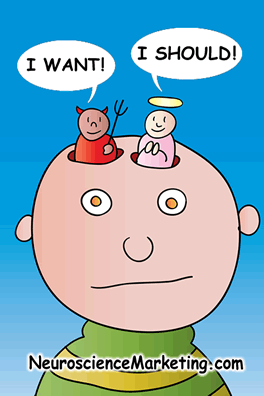“Want” vs. “Should” – It’s All in The Timing
 Everyone is familiar with the want vs. should conflict. Do you order the loaded cheese fries as your side dish, or the steamed broccoli? You want the greasy fries, but you know you should order the broccoli. Do you cut the grass (should) or watch football (want)? Research by Todd Rogers, Katherine L. Milkman, and Max H. Bazerman at Harvard has shed some light on how we make these decisions. In I’ll Have the Ice Cream Soon and the Vegetables Later: Decreasing Impatience over Time in Online Grocery Orders, the researchers describe how people make those decisions. Sarah Jane Gilbert interviewed Rogers and Milkman for the Harvard Business School Working Knowledge newsletter, and reported the conversation in Understanding the ‘Want’ vs. ‘Should’ Decision. Rogers and Milkman responded to Gilbert’s question about the duality of behavior they observed:
Everyone is familiar with the want vs. should conflict. Do you order the loaded cheese fries as your side dish, or the steamed broccoli? You want the greasy fries, but you know you should order the broccoli. Do you cut the grass (should) or watch football (want)? Research by Todd Rogers, Katherine L. Milkman, and Max H. Bazerman at Harvard has shed some light on how we make these decisions. In I’ll Have the Ice Cream Soon and the Vegetables Later: Decreasing Impatience over Time in Online Grocery Orders, the researchers describe how people make those decisions. Sarah Jane Gilbert interviewed Rogers and Milkman for the Harvard Business School Working Knowledge newsletter, and reported the conversation in Understanding the ‘Want’ vs. ‘Should’ Decision. Rogers and Milkman responded to Gilbert’s question about the duality of behavior they observed:
People often behave as if they possess multiple selves with different, competing interests. We call 2 of these metaphorical selves the “want-self” and the “should-self.”
The want-self is myopic and desires instant gratification. If left to its own devices, the want-self would always act on immediate, visceral desires (e.g., spending instead of saving money, eating junk food instead of health food). The should-self, on the other hand, prefers to behave in a way that will maximize long-run benefits. If left to its own devices, the should-self would always act on behalf of an individual’s long-term best interests (e.g., saving money or donating it to a good cause instead of spending frivolously, eating health food instead of junk food).
The study showed that timing was critical in the want vs. should battle. A decision on food for immediate consumption favored want items. Purchases for consumption days in the future were more likely to be healthy and nutritious (should items).
Movie Battles. Food isn’t the only battleground between our want-self and should-self where time of consumption differences exist. The same researchers studied DVD rental patterns and found that people ordered documentary (should watch) DVDs before action and other entertainment films (want to watch). They tended to return the documentaries after the other DVDs, however, indicating that at the moment of consumption (putting the DVD in the player) the want-self won out over the should-self.
Marketing Wants and Shoulds. The implications of this work are significant for many kinds of marketers. Just about every marketer sells either want or should items, and many sell both. Based on these studies, sales of want items can be maximized when they will be used right away; should items do best if marketed for future use. The authors point out that fruits and vegetables are among the first things the consumer sees as he begins to push his cart around the grocery store; this makes sense, as the beginning of the shopping trip is farthest away from time of product use. (We assume that’s why the supermarkets place candy bars right at the checkout – these items may not even make it to the car before they are consumed.) From a neuromarketing standpoint, it would be interesting to see how wants battle shoulds using fMRI scans.
Selling Online. The authors comment that online sellers and catalog merchants should be sure to take delivery time into account when promoting their merchandise – consumers are likely to order more want items if they are available for immediate delivery. On the other hand, they caution that customers will spend less overall the further in advance of delivery the order is placed.
These lessons could apply to just about anything. Selling sports cars? Assure the customer that he can drive away in his new convertible as soon as he signs the papers. Selling vitamins? Offer a promotion favoring purchases of a six-month supply.
As with many things in life and business, in the battle between the customer’s want-self and should-self, timing is everything.
(Thanks to Cool Marketing Stuff for pointing to this fascinating work.)
